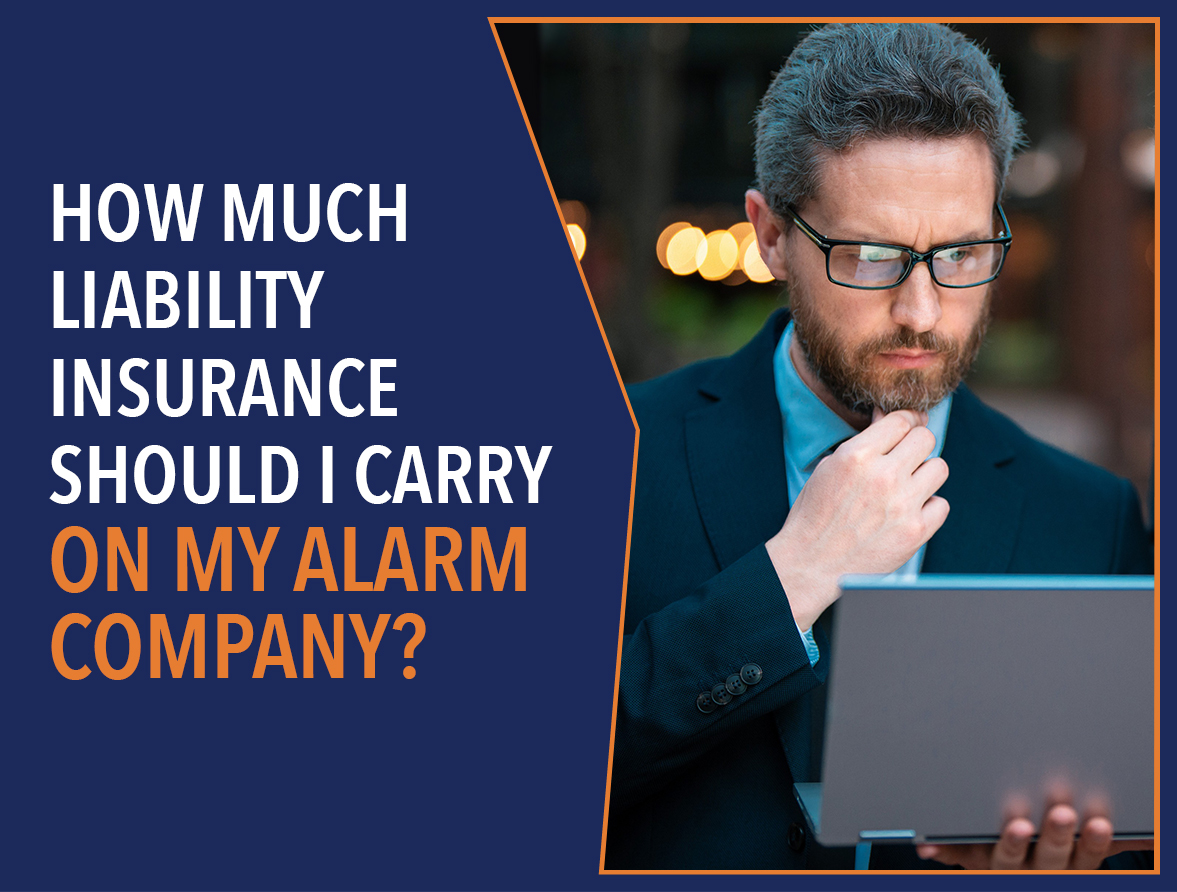
How Much Liability Insurance Should I Carry on My Alarm Company?
This is a business question I see frequently, but the answer is a classic “it depends” because there are so many variables that have to be weighed in the balance. We’ll attempt to define those variables and give you some context so you can arrive at your own answer and make an educated decision.
The best way to answer this question is to consider a variety of perspectives and how those might inform your answer. Here are the five main ones, in order of consideration:
(1) Is there a legal requirement to carry liability coverage? If so, how much? This one may seem obvious, but different states have different requirements, for example in California the law doesn’t require CSLB license holders that are corporations or sole proprietorships to carry General Liability coverage, but license holders that are Limited Liability Companies (LLCs) do: a $1,000,000 policy at minimum. BSIS has a similar requirement. Check with your state regulatory authorities to find out if there are requirements affecting you. These become your minimum coverage amounts.
(2) How much are you worth? (Coverage for your total Net worth). Often company owners will address coverage needs from the perspective of what they are worth and what they have to lose, but that’s a more relevant factor for bankruptcy or divorce proceedings. Certainly you want to protect your assets, but keep in mind that liability claims address damage you cause to 3rd parties, not damage to yourself, so here the question is about how much damage to others could you be responsible for. Which leads to the next possible way to ask our question:
(3) How much are your clients worth? (Coverage for total possible damages). Your customers will likely have this perspective in mind if you ask them. This is a good mental exercise to help identify your worst-case scenario and how much damage you could potentially be dealing with, but if you perform even a small job at a LARGE commercial facility and are accused of negligence in your work that somehow contributes to a facility shutdown or worse, how much in damages could the injured party go after? Hundreds of thousands? Millions? Tens of millions? What could happen if you installed a system in one unit of a large multi-story building, that then had a fire, and you were one of several companies named as a defendant in resulting claim litigation? Sky’s the limit? It can be difficult, if not impossible, to put a number on your worse-case-scenario, but it’s useful to consider. Which leads to the fourth possible way to address our question:
(4) How much insurance can you afford? (Cover as much as possible). I’ve heard some answer the question this way, which is a very safe answer. After all, if you’re trying to protect against threats both known and unknown, you may want all the protection money can buy. But is that practical? Perhaps, but one of the basic principles of risk management is to always consider the potential impact of events and their likelihood. So how likely is that $2M or $5M or $10M judgement against you? Hopefully after exploring this fourth perspective, you’ll appreciate the pathways exploring it led you down, but you’ll wind up re-wording it as “How much SHOULD I afford?”, which is more easily answered after considering our fifth and final perspective from which to address this issue:
(5) What amount of coverage is customary for an operation of my size and scope? This fifth way of asking our question is addressed by two separate audiences: First are your business customers, the ones who demand certain types and amounts of coverage on your COIs (Certificate Of Insurance). At some point you will run across a customer with a “requirement” for insurance coverage that is over and above what you normally carry, at which point you can either (a) buy the additionally required coverage, (b) negotiate to get that customer to pay for the additional coverage, or (c) negotiate to get the requirement waved. Getting the requirement waived is often dependent on how big the job is, how often you’re going to be working for this customer, and how many other customers of yours are asking for a similarly high amount of coverage. As you and your customers both grow, the expectation for higher levels of coverage grows and becomes more frequent. At the point it becomes clear it will pay for itself by qualifying you for additional jobs, it becomes a much easier decision to carry the higher limits and adjust your bids to reflect those additional costs.
The other audience that you should imagine asking this question (“what amount of liability coverage is customary for an operation of my size and scope?”) is a jury. The reasonable-person standard is a legal theory used in negligence law to determine if someone acted negligently. One area in which business owners can be accused of negligence is purchasing adequate liability insurance given their operation’s size and scope. And in the case of a mega-claim where you are found liable for an amount of damages that far exceed the limits of insurance you carried, you can HOPE the court will decide to award JUST the limits of your policy and call it a day, but the likelihood of that is diminished if there is clear evidence that a “reasonable person”, operating a company similar to yours in size and scope, should have carried a higher amount of coverage given the damage their work could potentially cause. This is an excellent question to run by your attorney, especially if they work frequently with businesses in your industry.
So what is that reasonable amount of coverage for your situation? How much liability coverage do other companies carry that are in your industry and are roughly your size and work with similar types of customers? The answer to that does NOT give you the complete answer to our title question, but it may help establish an amount you decide is the minimum you could carry, with the actual amount carried being somewhere above that.
The bottom line is that this is not a question you can answer in a vacuum. It requires feedback from trusted sources, so ask your attorney. Then ask your insurance broker. Then ask your CPA. Then ask your peers in your industry. You’ll get a variety of answers, likely reflecting one or more of the perspectives above. And then you can weigh them and make the best kind of business decision, an informed one.

About the Author
Larry St. John is a 20+ year veteran of insurance and risk management for the construction and electronic security industries.
He can be reached at LStJohn@eclipseinsurance.com




